Turmoil: President Emmerson Mnangagwa was a key figure in the Gukurahundi massacres of the 1980s, in which thousands of Zimbabweans, mostly Ndebele, were killed. (Jekesai Njikizana/AFP)
When Zimbabwe’s President Emmerson Mnangagwa rose to power, veteran political activist Ishmael Kauzani did not buy the “New Zimbabwe” narrative. He was suspicious of Mnangagwa’s long and brutal track record as one of Robert Mugabe’s top lieutenants. But he didn’t know that things would get so bad.
One incident from Kauzani’s last few days in Zimbabwe keeps playing through his mind.
He can hear the sound of his dog barking in the darkness of a January night outside his home in Kuwadzana township in Harare. Initially, Kauzani dismissed the bark as “misbehaviour”, but when the dog continued to bark, he started to worry. He left the house and walked outside. But in the darkness there was not much he could see.
“I decided to light the torch on my phone. I lit it and I came across eight men. One, who was in front, was holding an AK-47 and wearing a police uniform with an army jacket,” Kauzani said.
He remembers first retreating and then running fast as the men began shooting. “I heard some gunshots again from four different directions. Behind me, there were some guys chasing after me.”
But soon the chasing stopped. The assailants did not seem to be professional assassins. The soldiers closest to Kauzani, in a burst of their own fear, told the other soldiers to stop shooting. They were scared they might be killed in the crossfire.
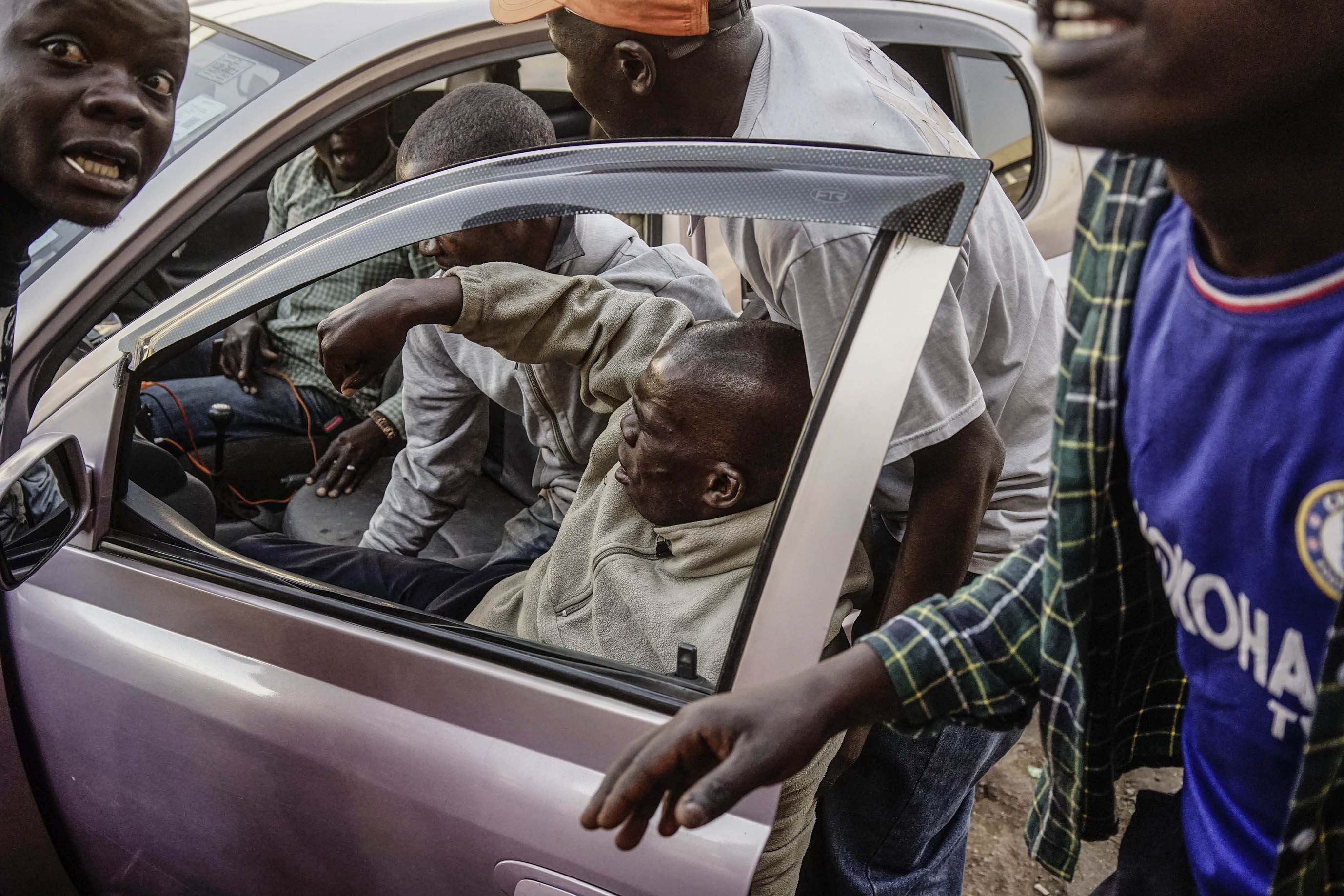 An injured man is carried into a car after protests erupted in August 2018 over alleged fraud in the elections (Zinyange Auntony/AFP)
An injured man is carried into a car after protests erupted in August 2018 over alleged fraud in the elections (Zinyange Auntony/AFP)
The shooting stopped, but Kauzani kept running. He found himself in a maize field where he hid, squatting low until he was sure it was safe. He then continued running until he reached a friend’s house where he could safely spend the night.
Eventually, he ran all the way to South Africa, taking his wife and child with him. It is not his first flight into exile. In 2008, he left Zimbabwe amid fears that his own party, the opposition Movement for Democratic Change (MDC), wanted to kill him. Kauzani’s brother had been killed just a little while earlier.
This time, there was one unusual item he carried with him as he crossed the border: a bullet cartridge his wife had picked up before the assailants could find it.
The Kauzanis do not know the exact identity of their attackers, but they are convinced the Zimbabwean government was responsible. At the time, in mid-January, soldiers, police and a paramilitary organisation allegedly linked to the ruling Zanu-PF were implementing a brutal crackdown targeting opposition party supporters, trade unionists and civil society groups. The crackdown was allegedly precipitated by a national stayaway organised by unions and civil society groups. Zimbabweans were encouraged to stay at home in protest against a huge fuel price hike. Dozens of people were killed and hundreds more assaulted. More than 1 000 people were arrested.
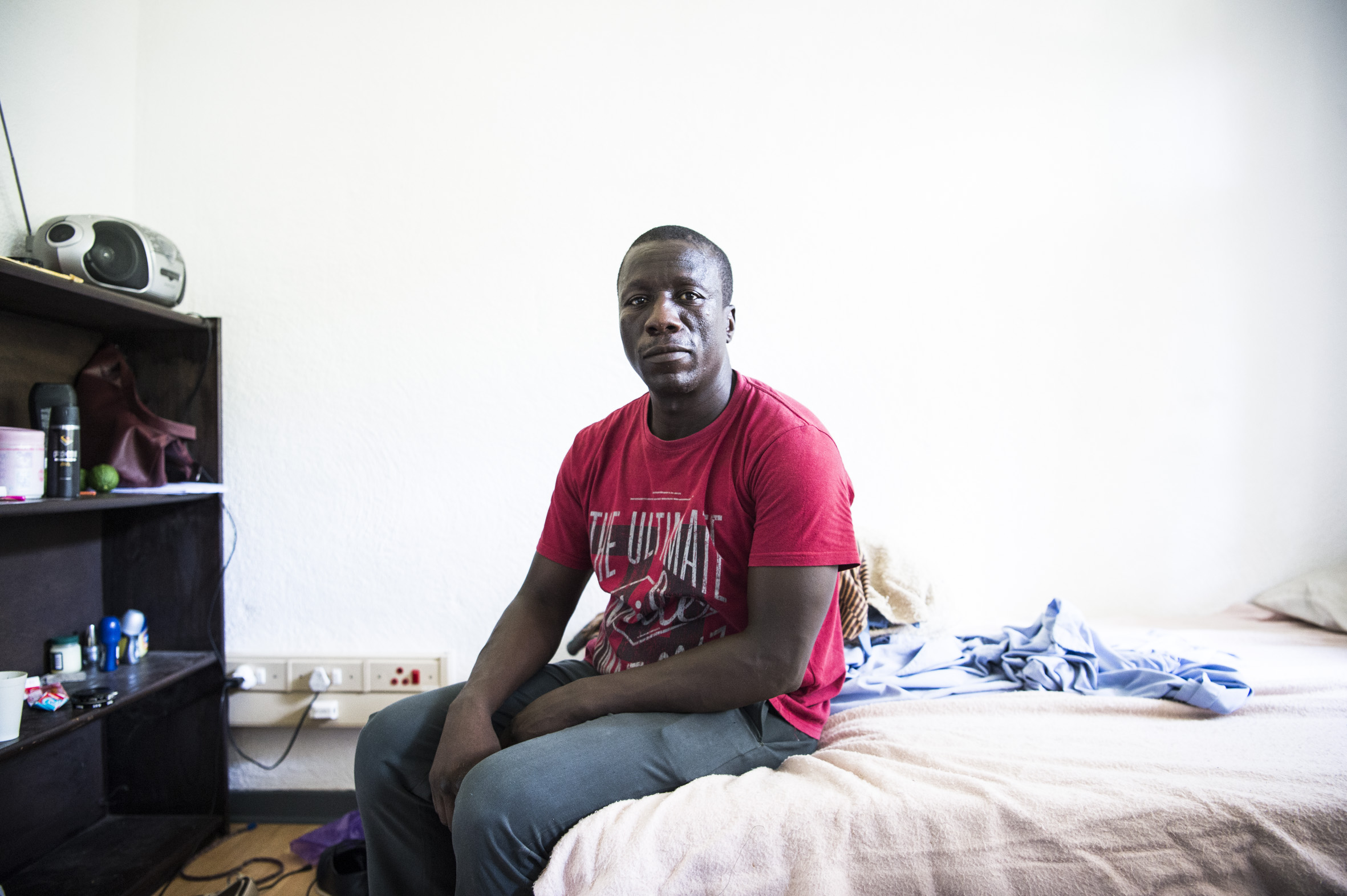 Exiles: Ishmail Kauzani fled after soldiers came for him in the night and shot at him. (Delwyn Verasamy)
Exiles: Ishmail Kauzani fled after soldiers came for him in the night and shot at him. (Delwyn Verasamy)
Others, like Kauzani, were forced into a sudden exile. “The numbers have been quite significant. They are in the hundreds,” said Dewa Mavhinga, the Southern Africa head of Human Rights Watch.
Some of this new generation of exiles went to Botswana, some to Zambia, and some as far as Kenya and Tanzania. But most of them ended up in South Africa.
“Beyond the issues of secure accommodation and of food and just keeping them safe, we have faced significant challenges,” said Mavhinga. “Many of them are bruised and battered and in need of medical attention. These are people with no medical aid, nothing. We have had to battle with that. How do we ensure that we have access to the medical attention they need? For some they never got that for three or four weeks.”
But the biggest issue the new arrivals face is fear. Most arrive without their families. “The challenge ends up being overwriting the blanket of fear over what has happened to the families left behind,” said Mavhinga.
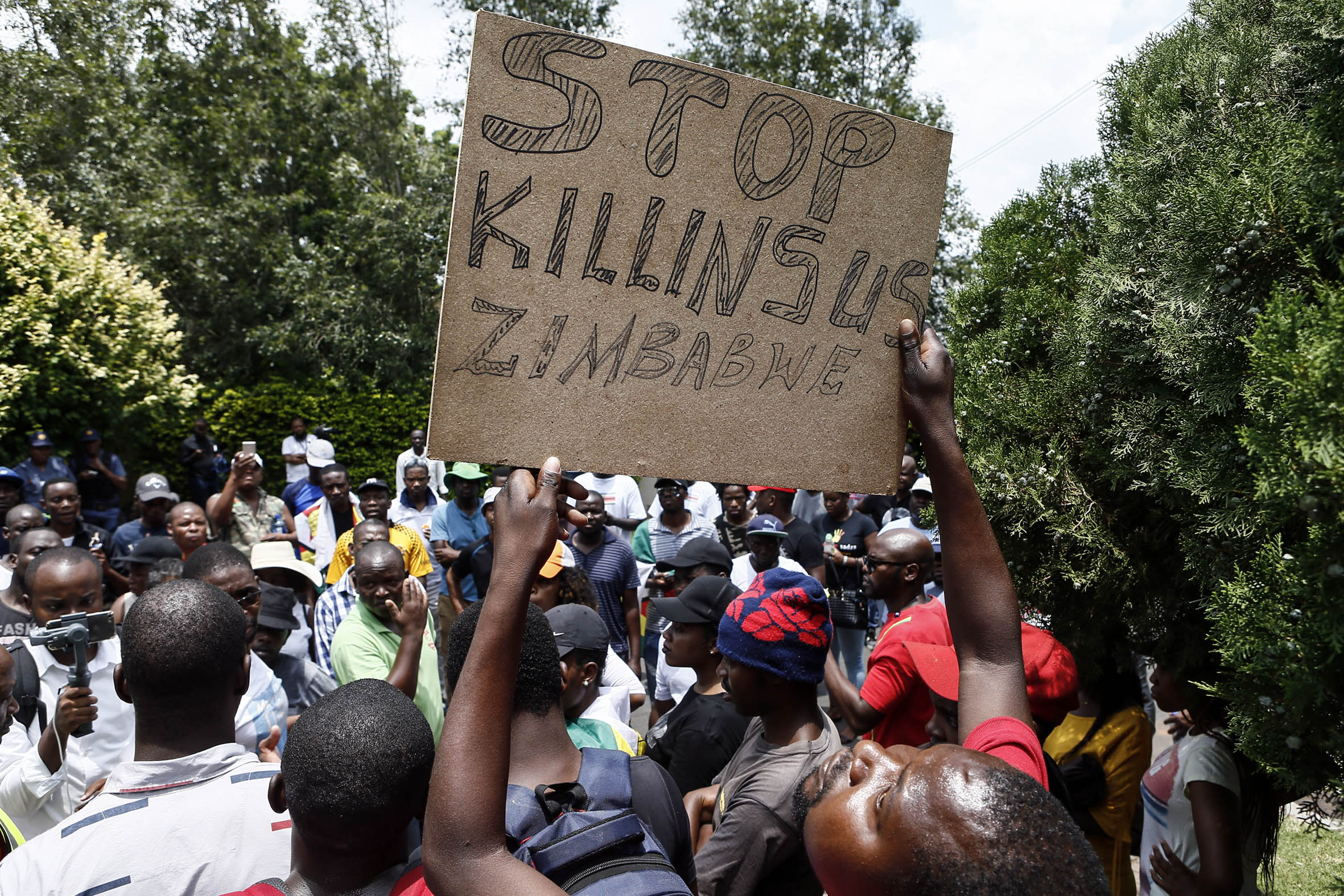 A demonstration flared up against the fuel price hike in January this year. (Phill Magakoe/AFP)
A demonstration flared up against the fuel price hike in January this year. (Phill Magakoe/AFP)
Among the new exiles is journalist Thandekile Moyo, who is still getting used to the idea of being an activist.
“I never even considered myself an activist until they called me one. It’s not like what I’m doing is politically motivated,” she said.
Moyo wrote an environmental column for The Standard, a private newspaper. Her column, she said, was a bit “naughty”, because she would use it to comment on inequality and poverty in the country. On Twitter, she was outspoken against injustice. The social media platform became a space in which she would rant about a despotic government and a citizenry she believed was not doing enough to take back the power.
“Me tweeting about it was trying to get people to be less apathetic. You find things happen and nobody calls them out. Zimbabweans have this way of moving on with their lives like nothing is happening and that’s why the system has lasted for so long,” she said.
It was Mnangagwa’s rise to power that motivated much of her commentary. Moyo’s family had survived the Gukurahundi genocide in the 1980s and now Mnangagwa, who has been implicated in the planning of the massacre, is president.
“That was when my outrage really started, because I’ve always been passionate about Gukurahundi. The coup [that toppled Mugabe] to me meant that Zimbabweans are not equally outraged about Gukurahundi, because why would they then say Mugabe must go and be replaced by someone who was actively part of the Gukurahundi?” she said.
Moyo received word that her name appeared on a government list of wanted people. Kauzani’s name was allegedly also on a list, but it is unclear if it was the same list.
At first Moyo ignored the warning, putting it down to “alarmist” people. But then, in mid-January, the government shut down the internet.
“I went into a panic mode. I said to myself, ‘Do these guys really think social media is such a big threat that they would shut down the internet’,” she said.
Moyo was known as an online activist. She put two and two together, and figured that, if the government had shut down the internet, they may try to shut her down too. So she ran.
She packed a bag and left for Francistown in Botswana with R175 in her pocket. Despite her circumstances, it was not a dramatic escape.
“I was in this fugitive mode, but it was so uneventful,” she laughs. “Along the way it was chilled. There was one roadblock and they just asked how’s the situation in Bulawayo. I guess those cops were also worried [about the protests]. When I got to the border I was so scared. I thought maybe there’s a list and these guys probably have my name.”
But even if her name was on the list, the border officials had no way to check it: their internet was shut down just like everyone else’s.
Once upon a time, Zimbabwe played host to South African exiles fleeing the apartheid regime. But after South Africa’s democratic transition and Zimbabwe’s reversion to authoritarianism, first under Mugabe and now Mnangagwa, the tables have turned. South Africa has become the refuge of choice for Zimbabweans fleeing both economic hardship and political oppression.
Nicholas Mabhena Egqabutho, the head of the Zimbabwe chapter of the African Diaspora Forum, helps to settle in new arrivals. In January, he noticed a sudden spike in the number of activists coming through.
“We have seen a number of activists that have come through, that were rounded up in Zimbabwe or threatened to be rounded up in Zimbabwe,” he said. Overwhelmed by the sudden influx, Egqabutho asked Butholezwe Nyathi to help.
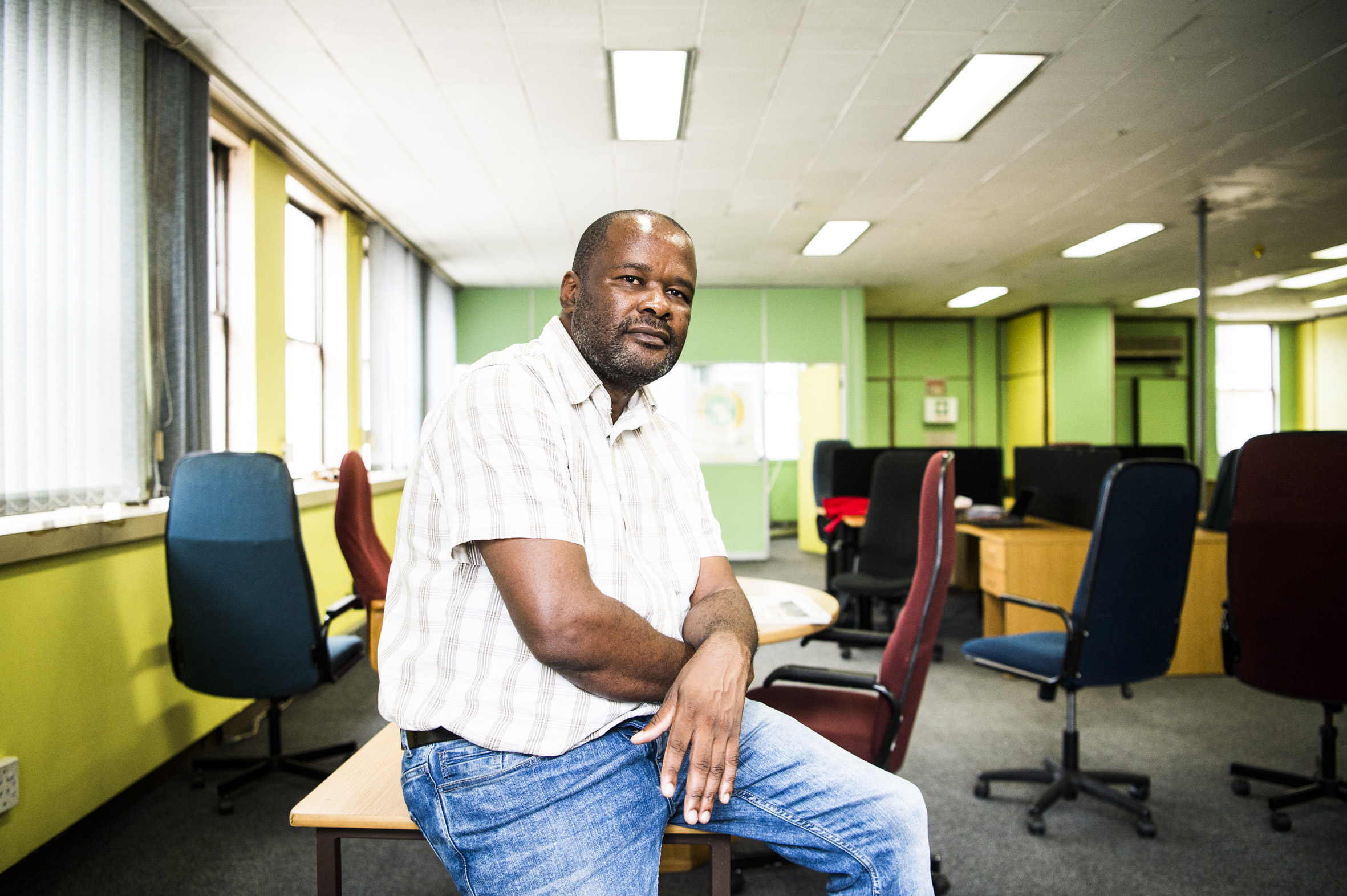 In January Nicholas Egqabutho , who heads the African Diaspora Forum in Zimbabwe, noticed a rise in the number of Zimbabweans seeking refuge in South Africa and turned to refugee Butholezwe Nyathi for help in finding them accommodation and registering them with home affairs. (Delwyn Verasamy)
In January Nicholas Egqabutho , who heads the African Diaspora Forum in Zimbabwe, noticed a rise in the number of Zimbabweans seeking refuge in South Africa and turned to refugee Butholezwe Nyathi for help in finding them accommodation and registering them with home affairs. (Delwyn Verasamy)
Nyathi fled to South Africa in 2003. At the time he was a nurse in Zimbabwe and was involved in underground political activities, including an attempt to establish a new nurses’ union. He had been receiving suspicious phone calls and realised that he was on state security’s radar.
“I ran away without making any proper arrangements,” said Nyathi.
He was assisted initially by other members of the MDC, which maintains a structure in South Africa. But life was tough. “I couldn’t practise my nursing in South Africa. I worked in a construction company just to survive. I found myself sharing a bed with three or four guys and would wake up in the morning to stand in the street where they hire guys for construction,” he said.
Nyathi was only able to practise nursing again in 2007, once his refugee status had been registered by the South African government. He has not been home to Zimbabwe since he fled. “In 2018, last year in March, I couldn’t bury my dad. I last saw him in 2009. My auntie passed yesterday. I can’t even go and bury her. Last time it was my dad; this time it’s my auntie. It’s painful.”
He has been assisting with logistics for this year’s new arrivals, helping to find them a place to stay and guiding them through the daunting bureaucratic process of registering with the home affairs department.
Kauzani and his family were among those he has helped.
“I think if we help comrades, if we stick together and stay organised, if we keep each other company, then we can encourage those in the same situation,” Nyathi said.
But he warns the new arrivals that, like him, they could be in for the long haul: “This Zimbabwean thing has been going on for a long time.”
Exile is not a life sentence for everyone. Some of the Zimbabweans who fled to South Africa in January have returned home, willing to risk the consequences.
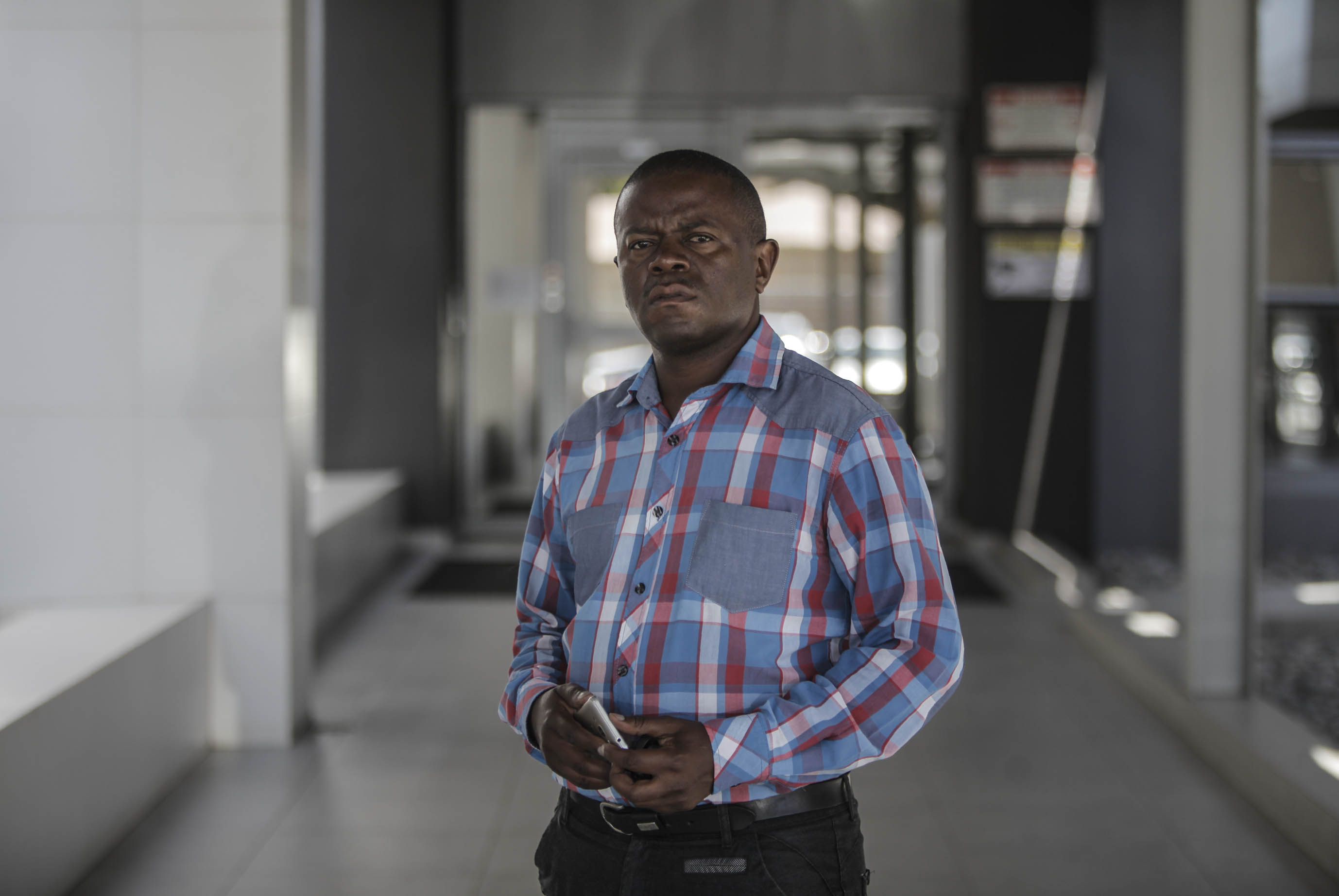 Butholezwe Nyathi (Delwyn Verasamy)
Butholezwe Nyathi (Delwyn Verasamy)
“I’m back in Zimbabwe, but I am maintaining low activity because I’m not sure what the situation is. And I’m getting reports that they are looking for me,” said Mfundo Mlilo, the director of the Combined Harare Residents’ Association.
Mlilo was in Harare when the crackdown began. He is a prominent activist and had been mobilising members to participate in the national shutdown. On January 16, he got word that two trucks packed with police and soldiers were en route to arrest him. He got in a car immediately and drove to Zambia. From there he flew to Johannesburg.
“It was scary. At that moment my father-in-law had been picked up and beaten up heavily,” he said. “I feared for my life and escaped.”
Once in South Africa, Mlilo got support from the Action Support Centre and Freedom House. He was given accommodation in a compound along with 70 other activists. It was a difficult, stressful time.
After one month in exile, he made the decision to return home. More than half of those he stayed with in the complex have made the same decision. Circumstances on the ground have changed — for now, at least.
“The risk profile keeps on changing over time. [Before] it was harm, injury or death, it moved to detention and trial, and now they may even have lost interest. The situation now has calmed down. We hear very little about targets from the state, there have been very few people targeted, only isolated incidents,” he said.
The crackdown has had a devastating effect on civil society, according to Mlilo. “Because of the violent response by the state we have had people go into hiding and rethinking … It has indeed affected the ability of civil society to organise. The state is aware that a violent crackdown disheartens people, demobilises people. The targeted attacks disturb the whole process,” he said.
But that does not mean the state has won. “This thing was simmering for some time and people are angry about many other things. The fuel thing lifted the lid. The situation has not changed. We have flagrant violations in human rights, collapse in social services, the economic situation turning bad. Over time these demonstrations will continue to come back again. In fact, it is going [to be] even worse.”